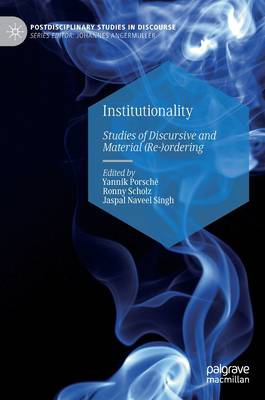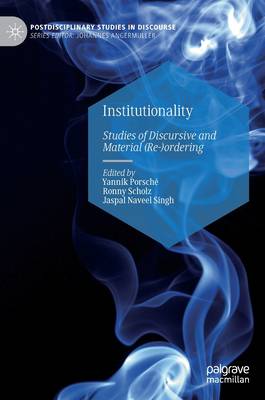
- Afhalen na 1 uur in een winkel met voorraad
- Gratis thuislevering in België
- Ruim aanbod met 7 miljoen producten
- Afhalen na 1 uur in een winkel met voorraad
- Gratis thuislevering in België
- Ruim aanbod met 7 miljoen producten
Institutionality
Studies of Discursive and Material (Re-)Ordering
Omschrijving
This edited book brings together humanities and social sciences scholars from the various disciplines at the nexus of discourse studies and ethnography to reflect on questions of institutional practices and their political concerns. Institutional order plays an important role in structuring power relations in society. Yet, contrary to common understandings of structure, institutional orders are far from fixed or stable. They constantly change, and they are resisted and reimagined by social actors. The 20 studies collected in this edited volume develop the notion of institutionality as an overarching perspective to explore how institutional actors and institutional practices order and reorder power in societies across the globe. Thereby the chapters pay special attention to the fluidity, volatility, fragility, and ambiguity of order, and consequently to its claims to authority. Employing a broad range of discourse analytic and ethnographic methodologies, the studies show how institutions are discursively and materially constructed, defined, represented and how they are made relevant and become powerful - or how they are resisted, transformed or lose significance - in interaction. Readers will obtain nuanced insights into ways in which differently positioned social actors engage in struggles about how institutions can be imagined and enacted across several domains, such as workplace interactions, architecture, mass-media representations or organisational publicity. This book will be of interest to readers in Applied Linguistics, Discourse and Society, Critical Discourse Analysis, Political Theory and Communication Studies.
Specificaties
Betrokkenen
- Uitgeverij:
Inhoud
- Aantal bladzijden:
- 561
- Taal:
- Engels
- Reeks:
Eigenschappen
- Productcode (EAN):
- 9783030969684
- Verschijningsdatum:
- 3/06/2022
- Uitvoering:
- Hardcover
- Formaat:
- Genaaid
- Afmetingen:
- 148 mm x 210 mm
- Gewicht:
- 861 g

Alleen bij Standaard Boekhandel
Beoordelingen
We publiceren alleen reviews die voldoen aan de voorwaarden voor reviews. Bekijk onze voorwaarden voor reviews.











